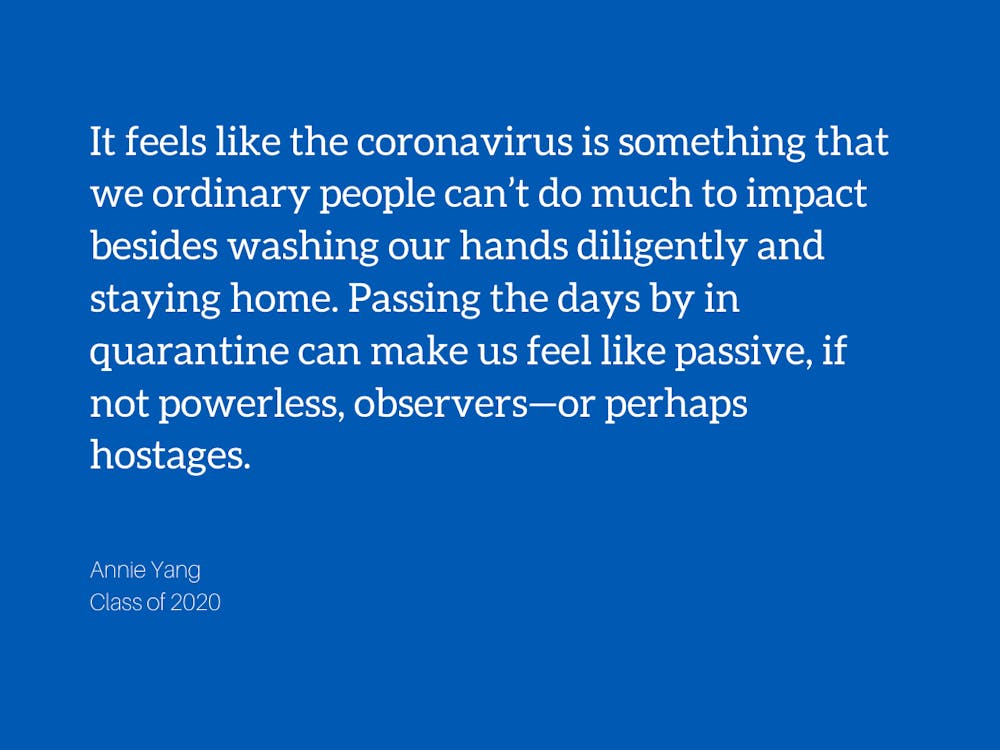It is difficult to believe that it has only been a few weeks since I left Duke for spring break with the (perhaps naive) assumption that I would return. In that short time, with the shift to online classes, student evacuation/evictions and stay-at-home orders, our lives have been upended in the wake of the coronavirus.
And yet, cutting through the chaos and confusion, a kind of clarity emerges. Coronavirus has laid bare the greatest cruelties of capitalism, white supremacy and the status quo. But it has also opened up a window into an alternative world.
Cities throughout the country are declaring eviction moratoriums while organizers push for rent freezes, exposing how landlords profit off gentrification, redlining and the hard-earned income of the working class. Although we’ve known for years that there are more empty homes than houseless people, only now are houseless people finally getting a roof over their heads.
But, when the virus is contained, will we go back to evicting people who can’t afford rent or harassing houseless people who have nowhere to go? Or will COVID-19 make us realize that we should have never put a price on the human right to housing in the first place?
And for incarcerated people, who are disproportionately low-income Black and brown people, social distancing is an impossibility in prisons with inhumane living conditions, inadequate meals and abysmal medical care. My home state of New York is opportunistically capitalizing on this crisis to use prison labor, or modern-day slavery, to make hand sanitizer.
Many people are beginning to realize the inherent inhumanity of locking people up during a pandemic and are urging for the release of non-violent, low-risk prisoners. But the coronavirus should challenge us to act as prison abolitionists have for decades in challenging the existence of prisons themselves—and how they function in maintaining white supremacy, carceral violence, and punitive (in)justice.
For years, nationalized healthcare, student debt elimination and reparations were all dismissed as pipe dreams, impossible to fund, and yet the government magically materialized trillions of dollars out of thin air to pump into the stock market. The money was always there, but the American ruling class uses it not to help people but instead to perpetuate white supremacy, capitalism and imperialism. How can we change things so that our society actually serves its people?
A little closer to home, this is a moment when the foundations of the university can be dismantled and reimagined, lest we reproduce Duke exactly the same as it was before, just on Zoom this time.
My hope is that Duke’s response to the coronavirus may serve as a wake-up call to what campus activists and organizers have been saying for years. For example, instead of stepping in like UNC or Emory by establishing funds to assist students financially during COVID-19, Duke and its 8.6 billion dollar endowment has, yet again, left it up to students to self-organize and assist one another.
The campus shutdown has exacerbated the precarity of contract workers at Duke, who are not considered employees of the university and frequently do not get paid the $15 minimum wage Duke pledged to in 2017, and workers have pressured the administration to make some commitments to pay them amid a global health crisis. So many “unskilled” workers such as grocery clerks, farmworkers, delivery drivers and sanitation workers, whose labor was constantly devalued and discounted are now considered essential workers—when they have served as the backbone of society this entire time.
The same goes for these contract workers, without whom the university would not be able to function. But after COVID-19, will Duke’s contract workers get the adequate pay and respect that they deserve?
As Duke transitions to S/U grading, this crisis should make it clear that the playing field has never been level, not even at Duke, and grades are less a measure of intelligence than access to resources. The question shouldn’t be should I pass/fail my class or still get a letter grade, but why do we even have grades at all?
Many people are waiting for this all to be over, yearning for stability and a return to normalcy. However, it is very likely that nothing will be the same in the post-coronavirus world. Moreover, the coronavirus has torn away the thin veil of capitalism, revealing the naked exploitation that underwrites our “stability” and “normalcy.” We cannot return to that world.
Capitalism is sick and decaying, but socialism will not rise from the ashes by default. We can allow the ruling class to implement enhanced techno-surveillance (heard of Zoom lately?), summon the military to prevent “civil disturbances” and bailout corporations once again. We can allow Duke to continue offloading labor onto student organizers and shortchanging workers. Or we fight for a new, better world.
So, what is to be done? In short, organize!
Mutual aid efforts have sprouted up across the country, as tangible steps towards building the infrastructure and relationships of trust and care necessary in a kinder, more just world. Tenants are building power together and organizing themselves in anticipation of rent strikes to come. Campaigns to abolish ICE and the prison-industrial complex are more urgent than ever. Every aspect of the status quo has been impacted by COVID-19, but every aspect of the status quo can also be changed. Now is the time to demand the impossible.
It feels like the coronavirus is something that we ordinary people can’t do much to impact besides washing our hands diligently and staying home. Passing the days by in quarantine can make us feel like passive, if not powerless, observers—or perhaps hostages. But we all have much more power than we might think. And in this moment, solidarity and collective care are our best medicine.
Annie Yang is a Trinity senior. Her column, “planting seeds,” runs on alternate Mondays.
Get The Chronicle straight to your inbox
Sign up for our weekly newsletter. Cancel at any time.

